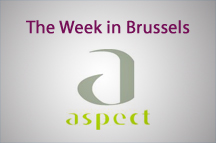 At face value, this week in Brussels has so far been dominated by two fairly weighty and portentous developments for the future, namely the antitrust case against Google’s Android to be launched by EU Competition Commissioner Margrethe Vestager and, the High Level Meeting on Excess Capacity and Structural Adjustment in the Steel Sector convened by the Belgian government and the OECD in Brussels. Both of which bode ill for the future. But before we consider each of these in turn, let’s tackle the ever present elephant in the room – Brexit and the Obama visit to the UK at David Cameron’s behest to bolster his campaign to remain in the EU.
At face value, this week in Brussels has so far been dominated by two fairly weighty and portentous developments for the future, namely the antitrust case against Google’s Android to be launched by EU Competition Commissioner Margrethe Vestager and, the High Level Meeting on Excess Capacity and Structural Adjustment in the Steel Sector convened by the Belgian government and the OECD in Brussels. Both of which bode ill for the future. But before we consider each of these in turn, let’s tackle the ever present elephant in the room – Brexit and the Obama visit to the UK at David Cameron’s behest to bolster his campaign to remain in the EU.
Strictly speaking, it’s slightly unorthodox to crowbar talk of Brexit into a Brussels column but who are we kidding? Let’s be frank, between now and the result of the referendum: Brexit is the only game in town on both sides of the Channel. After all, this was the week that saw Pier Carlo Padoan, the Italian Finance Minister, declare that ‘’Brexit is a major threat to Europe’’. Even our very own dog-eyed ‘’capo di tutti capi’’, Jean-Claude Juncker, came out bemoaning the EU Commission’s insufferable habit of interfering in the life of the ordinary citizen. And all that with a straight face!
 The crux of the Brexit matter this week surely has to be that if the British Prime Minister and de facto leader of the Remain camp, David Cameron, is monopolising the President of the U.S for three whole days, then both gentlemen must have some serious concerns about the direction the Remain campaign is heading in. The likes of Messrs Farage, Gove and Johnson are already smelling blood. Cries of ‘’Frit! Frit!’ emanating from the green benches in the House of Commons cannot now be very far off.
The crux of the Brexit matter this week surely has to be that if the British Prime Minister and de facto leader of the Remain camp, David Cameron, is monopolising the President of the U.S for three whole days, then both gentlemen must have some serious concerns about the direction the Remain campaign is heading in. The likes of Messrs Farage, Gove and Johnson are already smelling blood. Cries of ‘’Frit! Frit!’ emanating from the green benches in the House of Commons cannot now be very far off.
As a self-confessed supporter of the Remain camp, I couldn’t help but worry when I heard Lou Susman, former US Ambassador to the UK, say this week in reference to the President’s upcoming UK visit, that ‘’we want to do whatever Cameron thinks will help him win this vote but of course, it is entirely up to the British people which way they vote.’’ My compatriots outre-manche can be a contrary and bloody minded bunch at the best of times and I am not convinced that David Cameron basking in the reflected glory of President Obama will necessarily have the desired effect domestically speaking. Especially if the President goes into his hectoring professor routine. Brits don’t react well to the wagging finger of foreign leaders as history will attest.
Which brings us back to steel, Port Talbot, state aid and Tata Steel. The week began with UK Business Secretary Sajid Javid coming to Brussels to attend the High Level Meeting on Excess Capacity and Structural Adjustment in the Steel Sector and ended with Her Majesty’s Government declaring a willingness to take a 25% stake in any rescue of Tata Steel's UK operations. Let’s just hope for the sake of the Remain campaign that EU Commissioner for Competition Margrethe Vestager is kept busy with Google between now and 23rd June otherwise any untimely intervention on the merits of state aid could edge the UK electorate ever closer to the exit door. But I’d imagine Jean-Claude has already dispatched Jonathan Faull to nip that particular ‘’miscommunication’’ in the bud and make Margrethe an offer she cannot refuse.
As for Google, they seem to lurch from one crisis to the next in Brussels with apparent abandon. If the UK were to exit the EU after the UK referendum on EU membership in June 2016, then you can bet your bottom dollar that US tech companies will face even more problems in Brussels as British MEPs, Commission officials and the UK’s Permanent Representation to the EU would no longer be a moderating influence on some of their more protectionist and privacy fixated continental counterparts in Brussels. If I were Mark Zuckerberg, I’d be whispering in my President’s ear before Air Force One touches down in Blighty.














